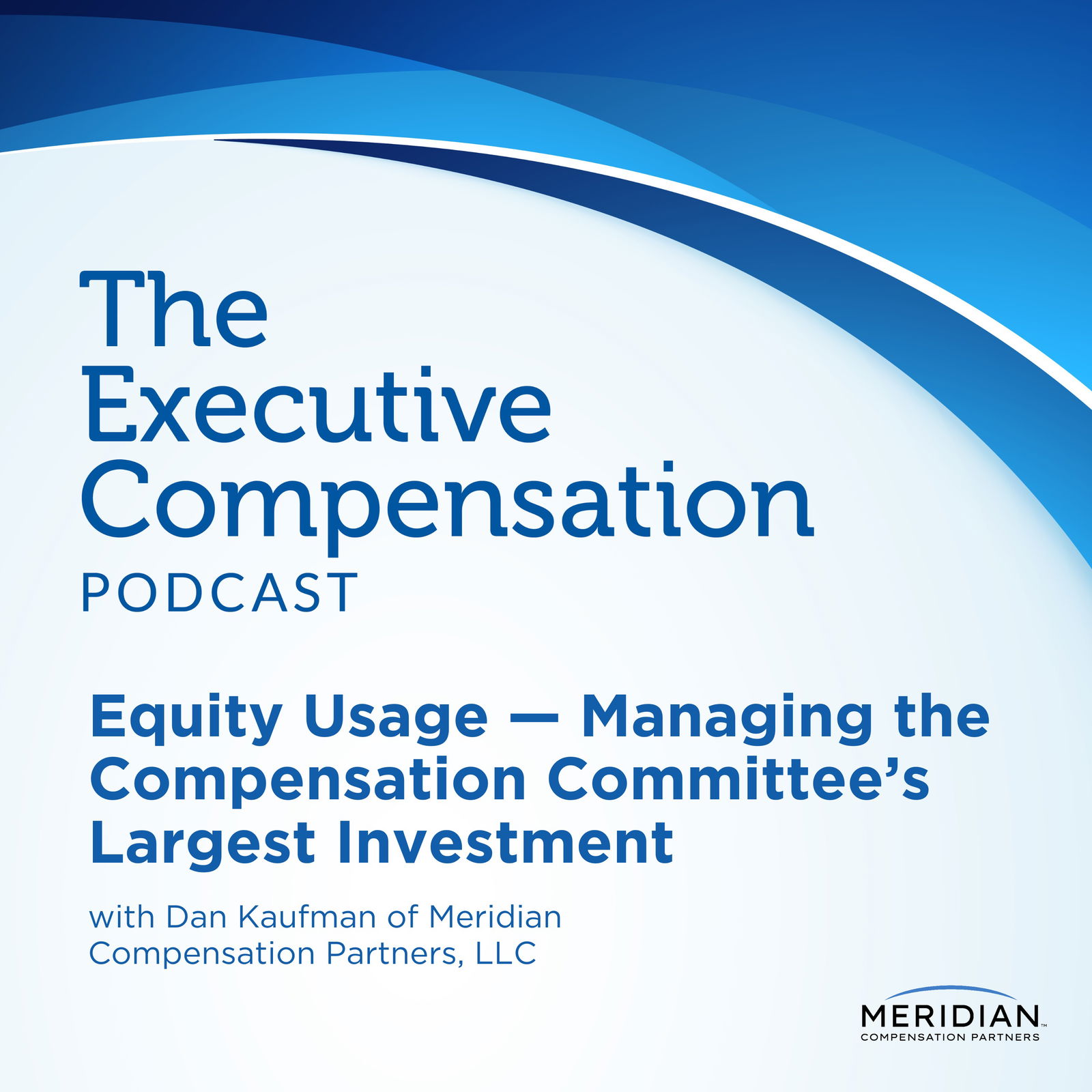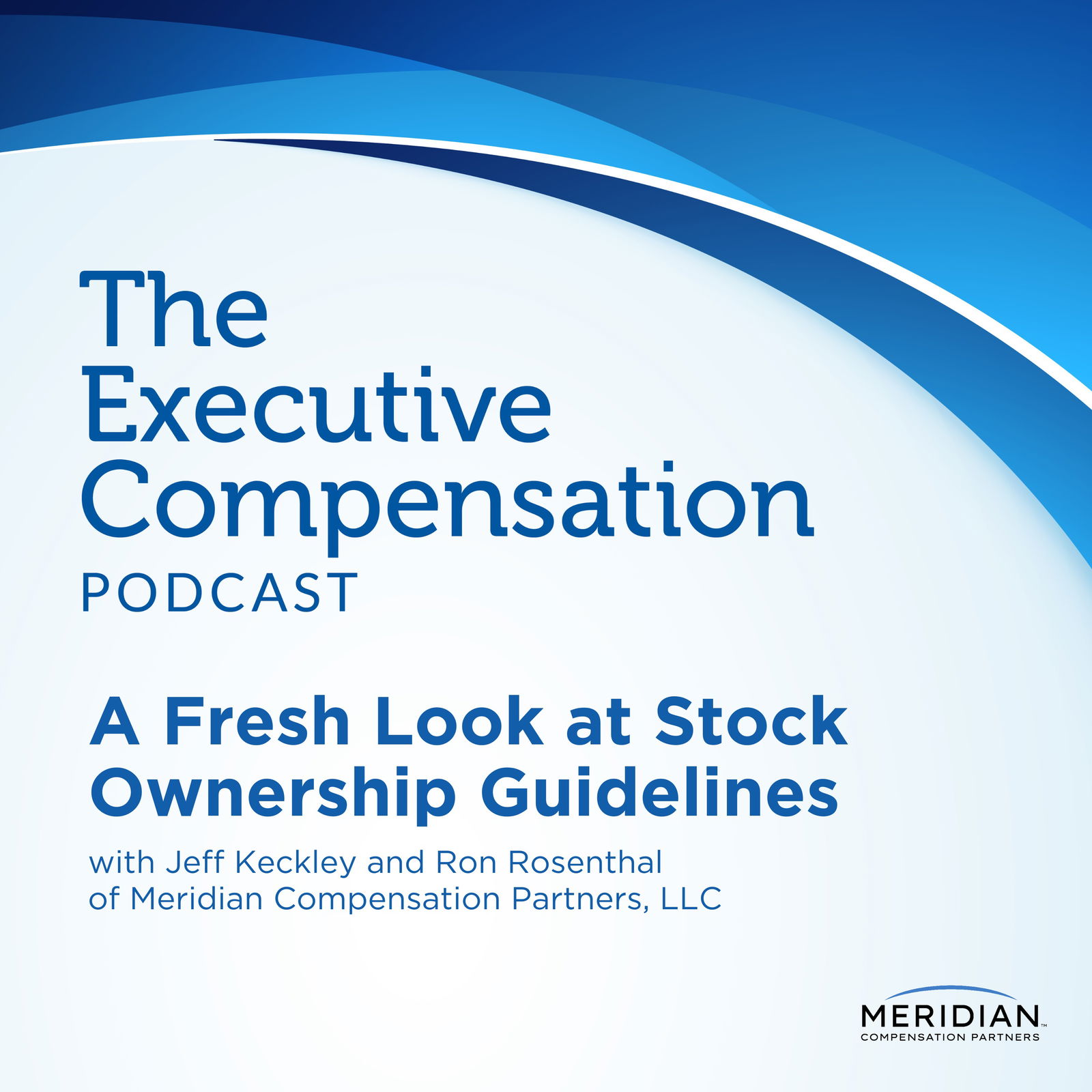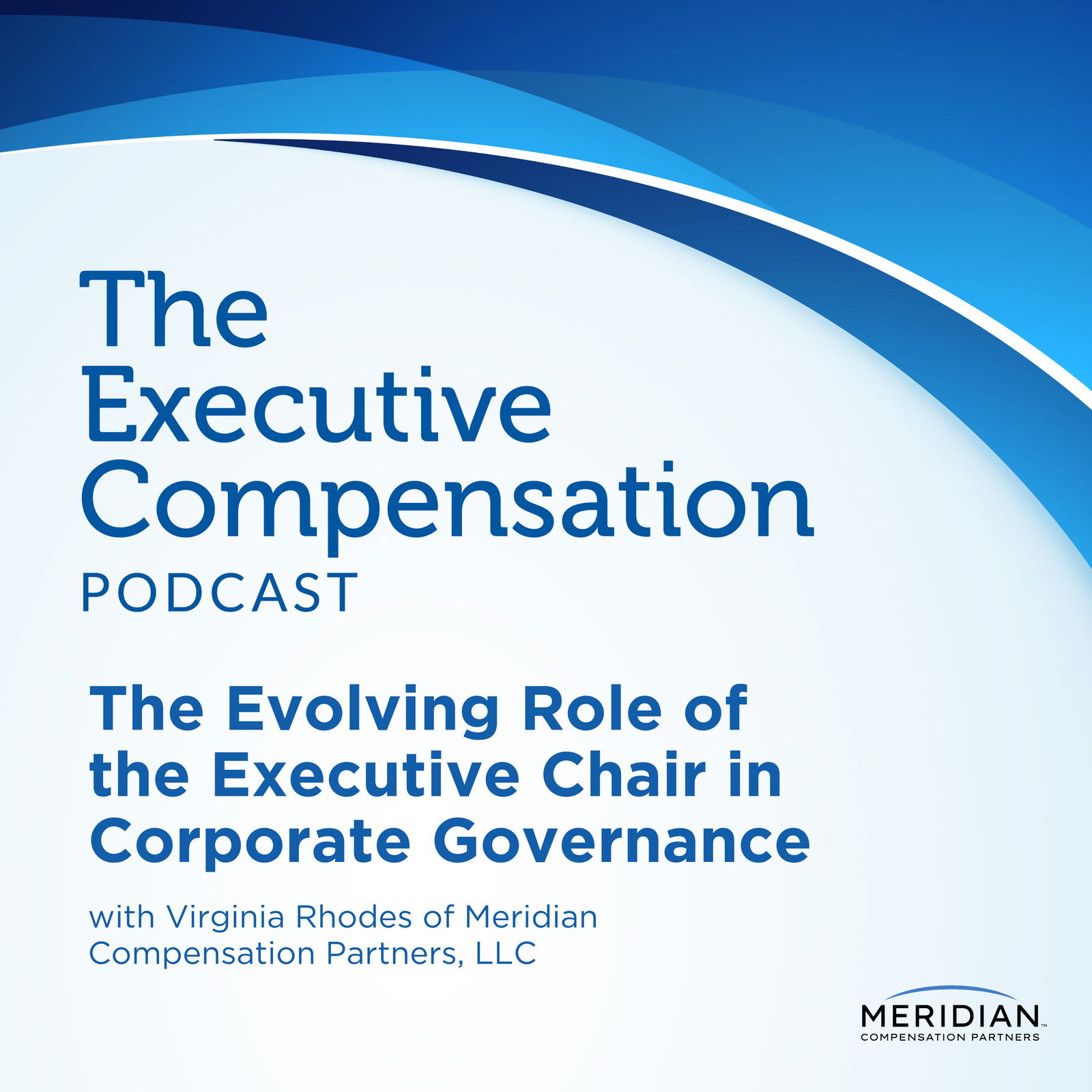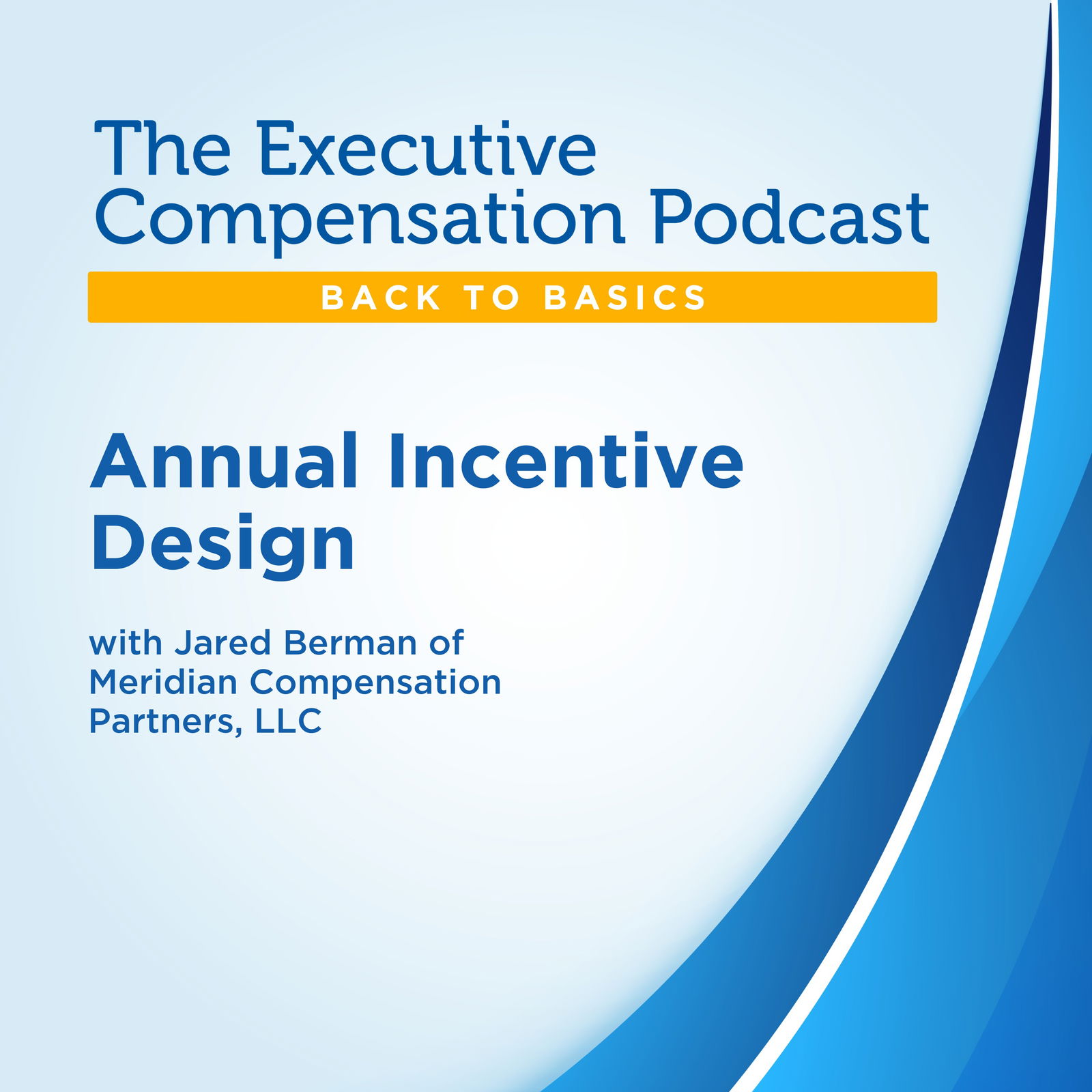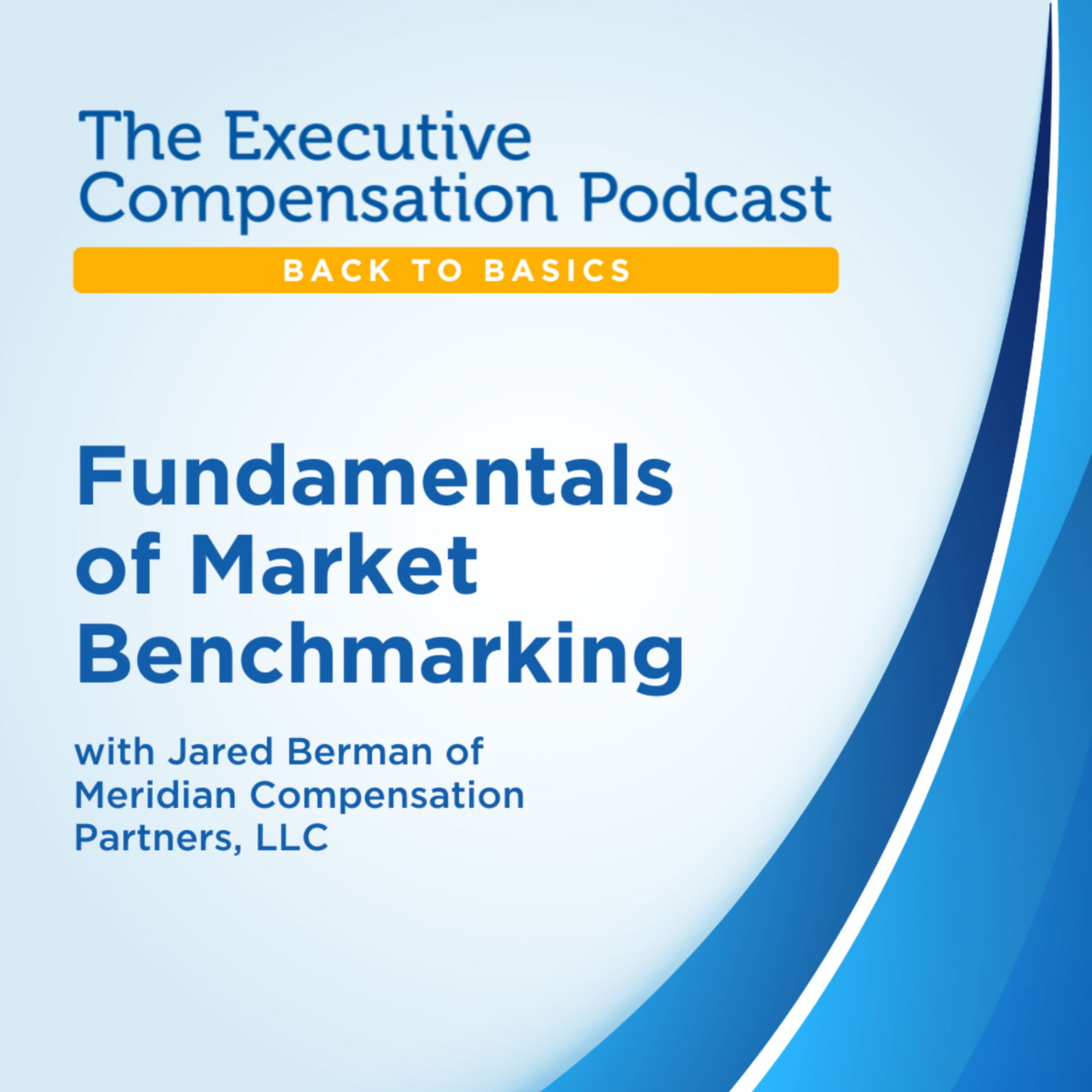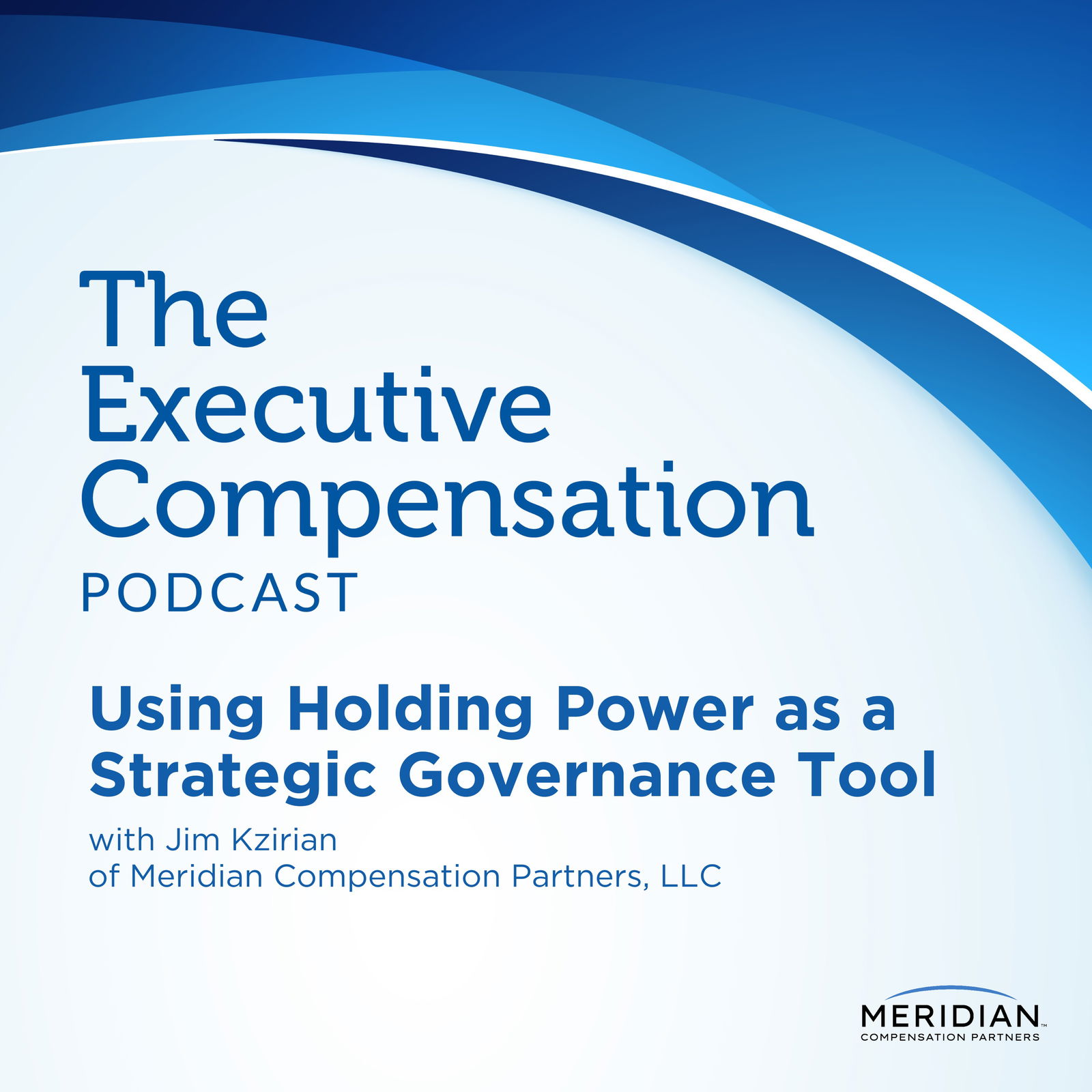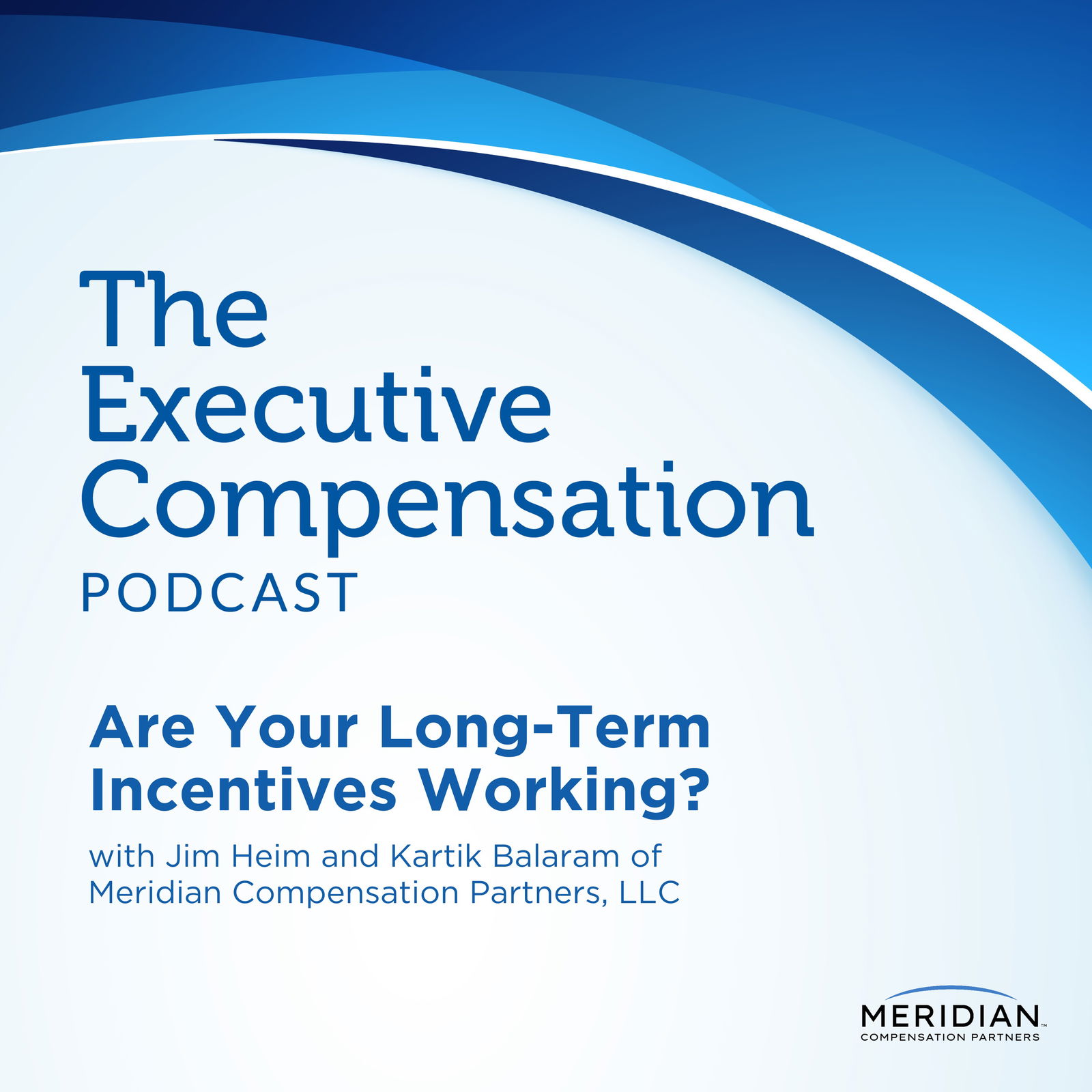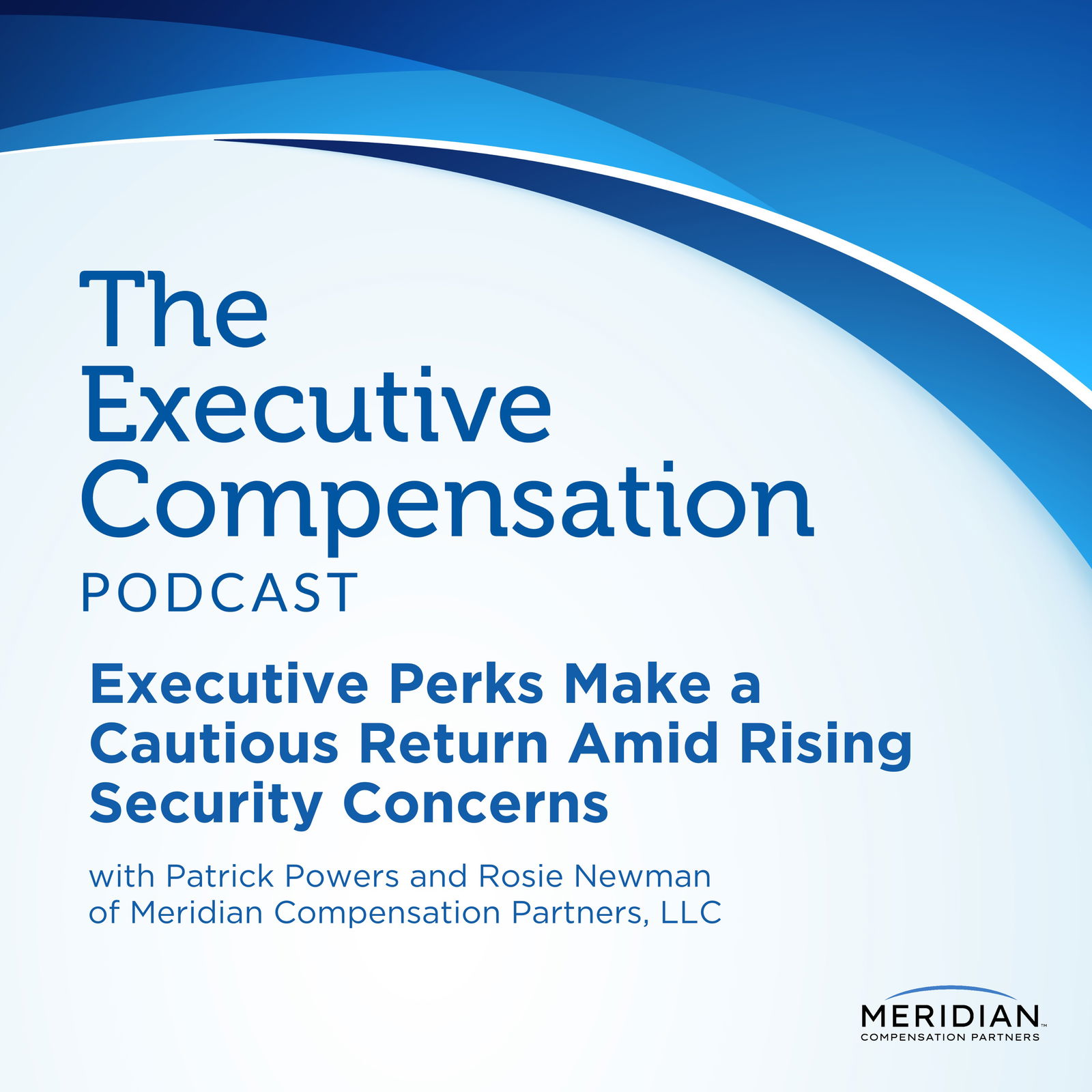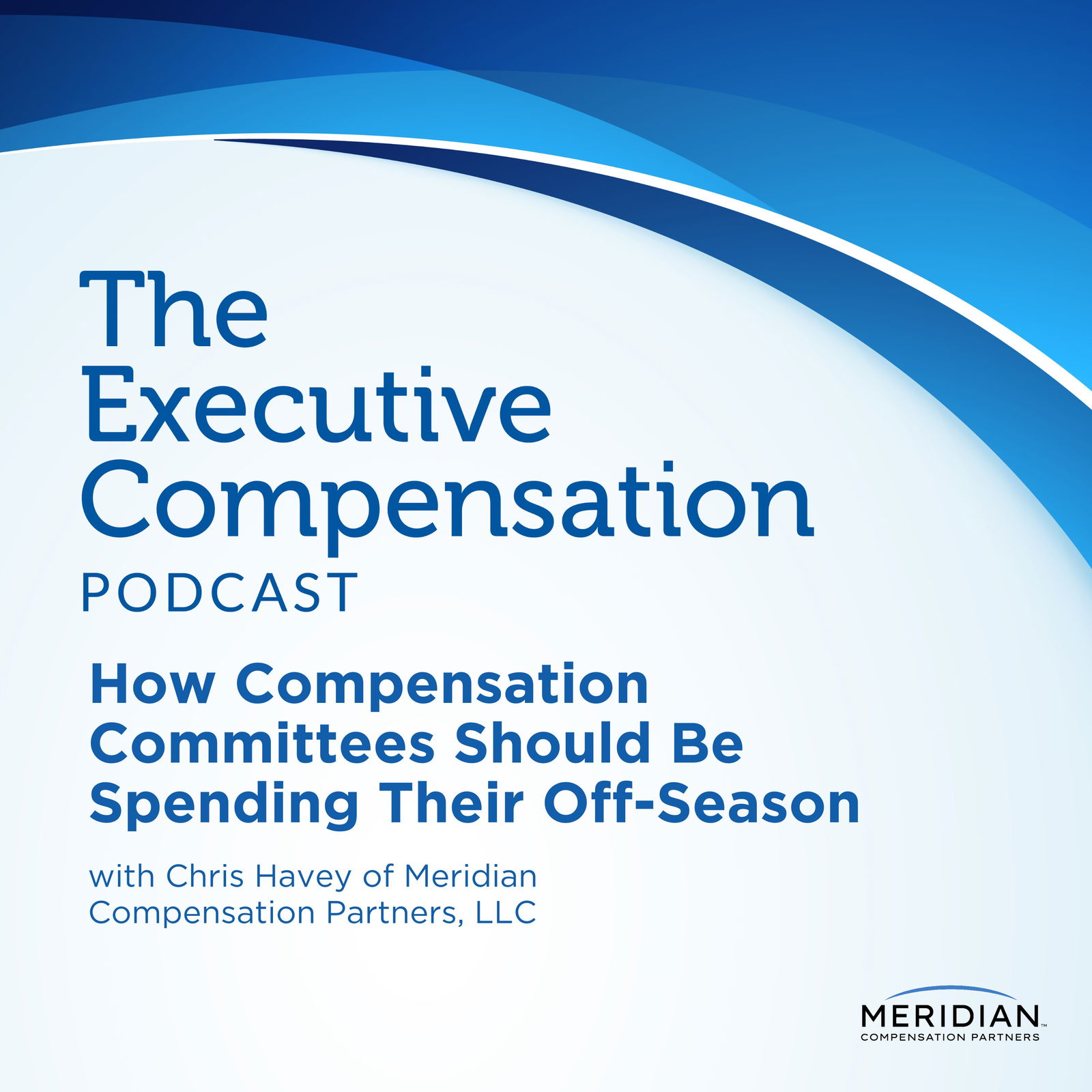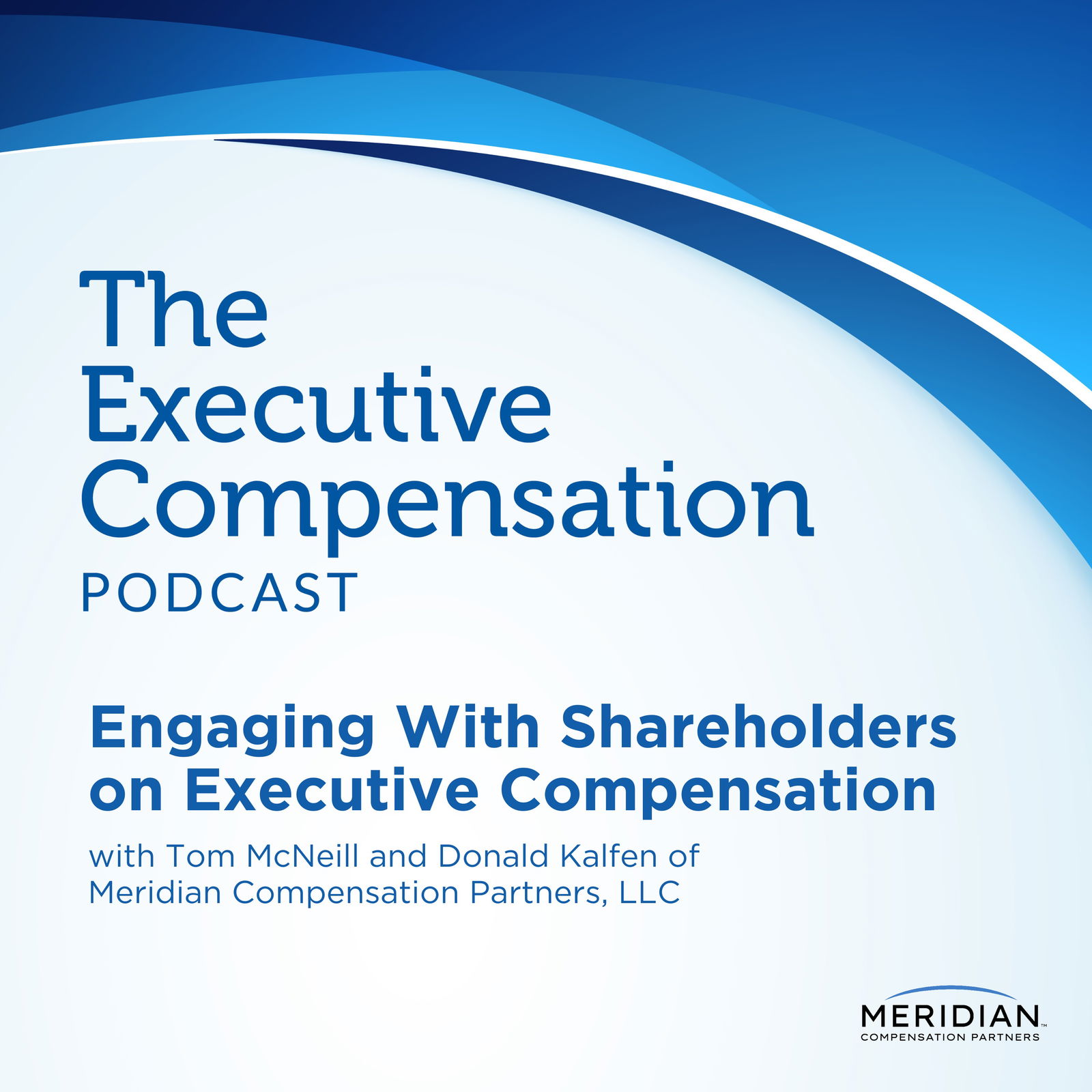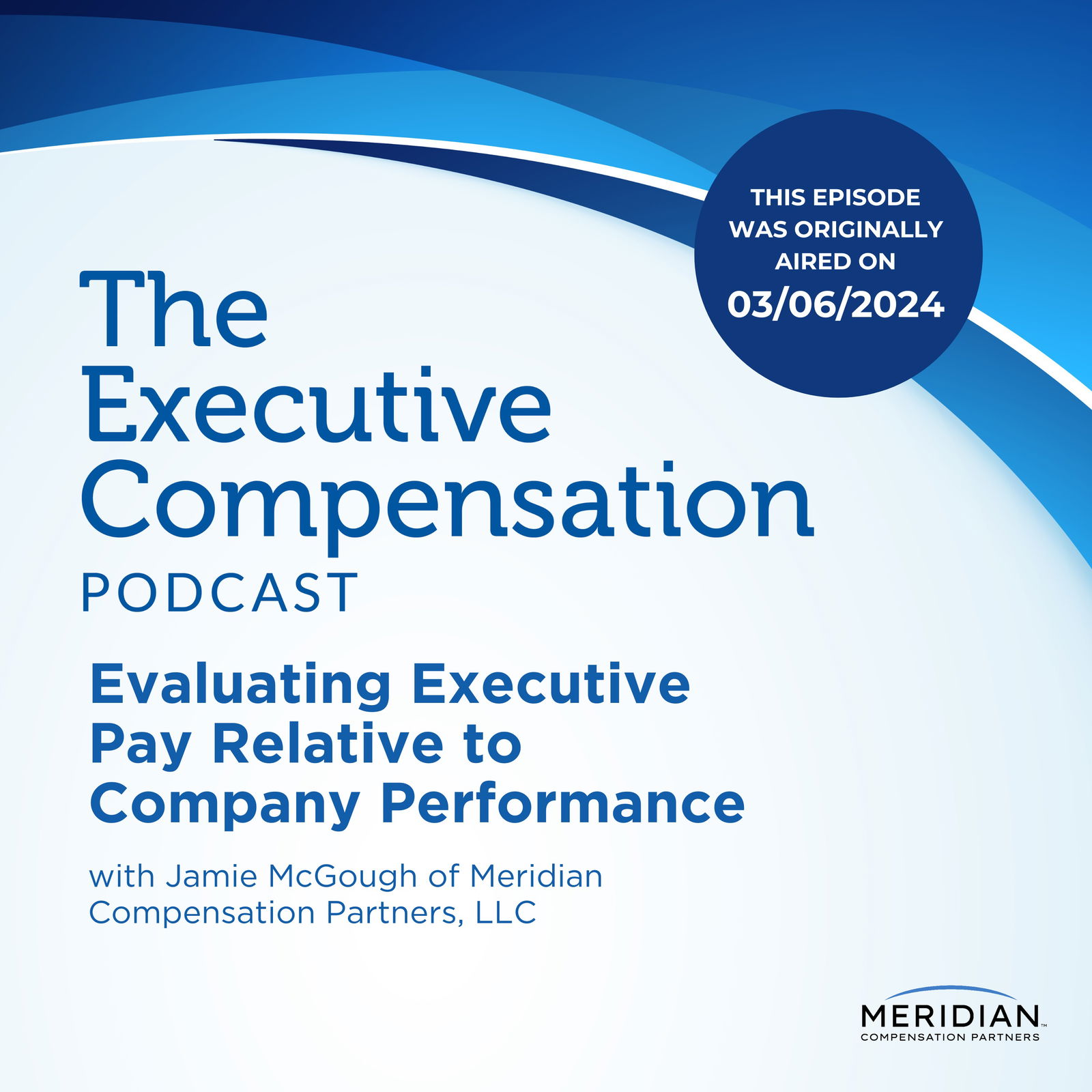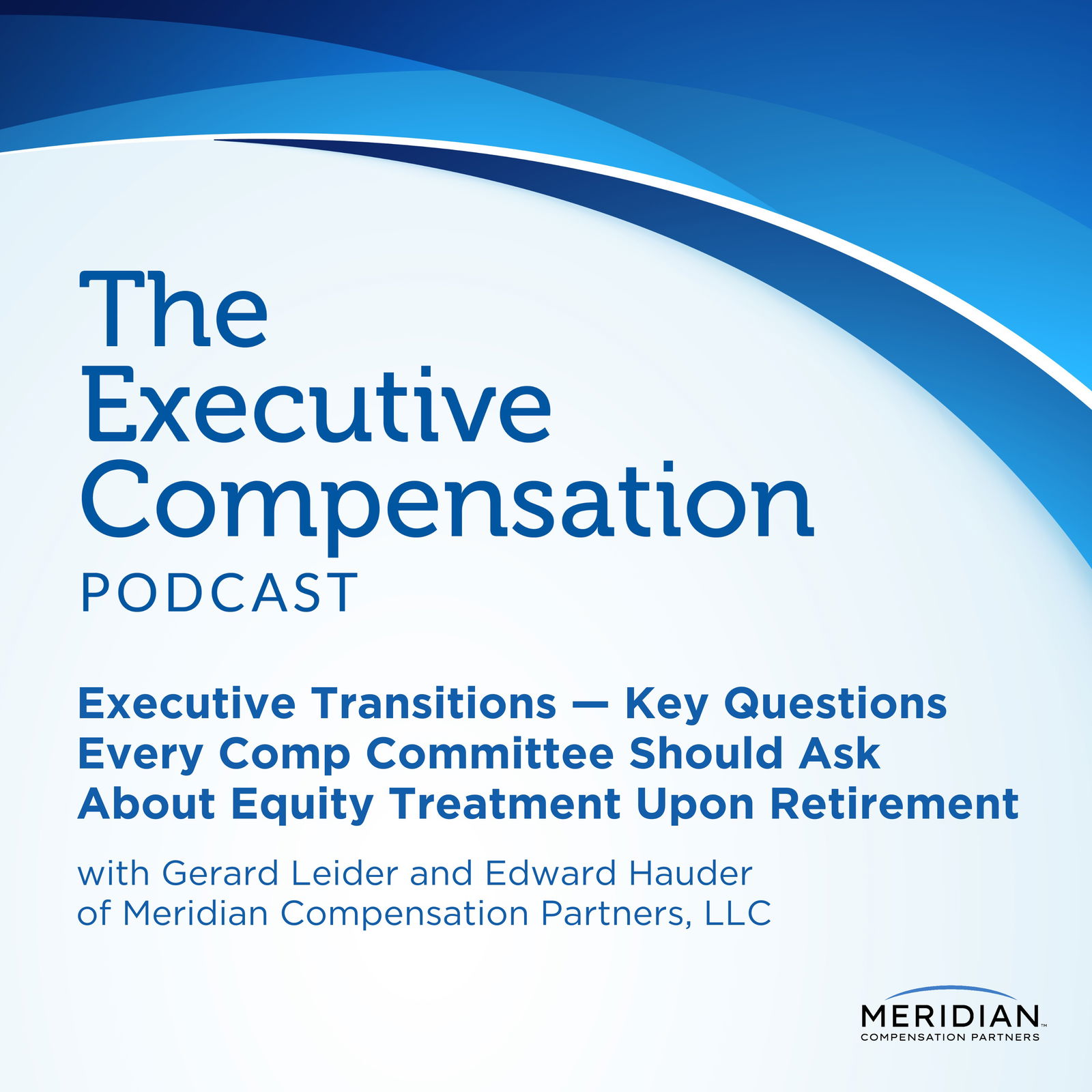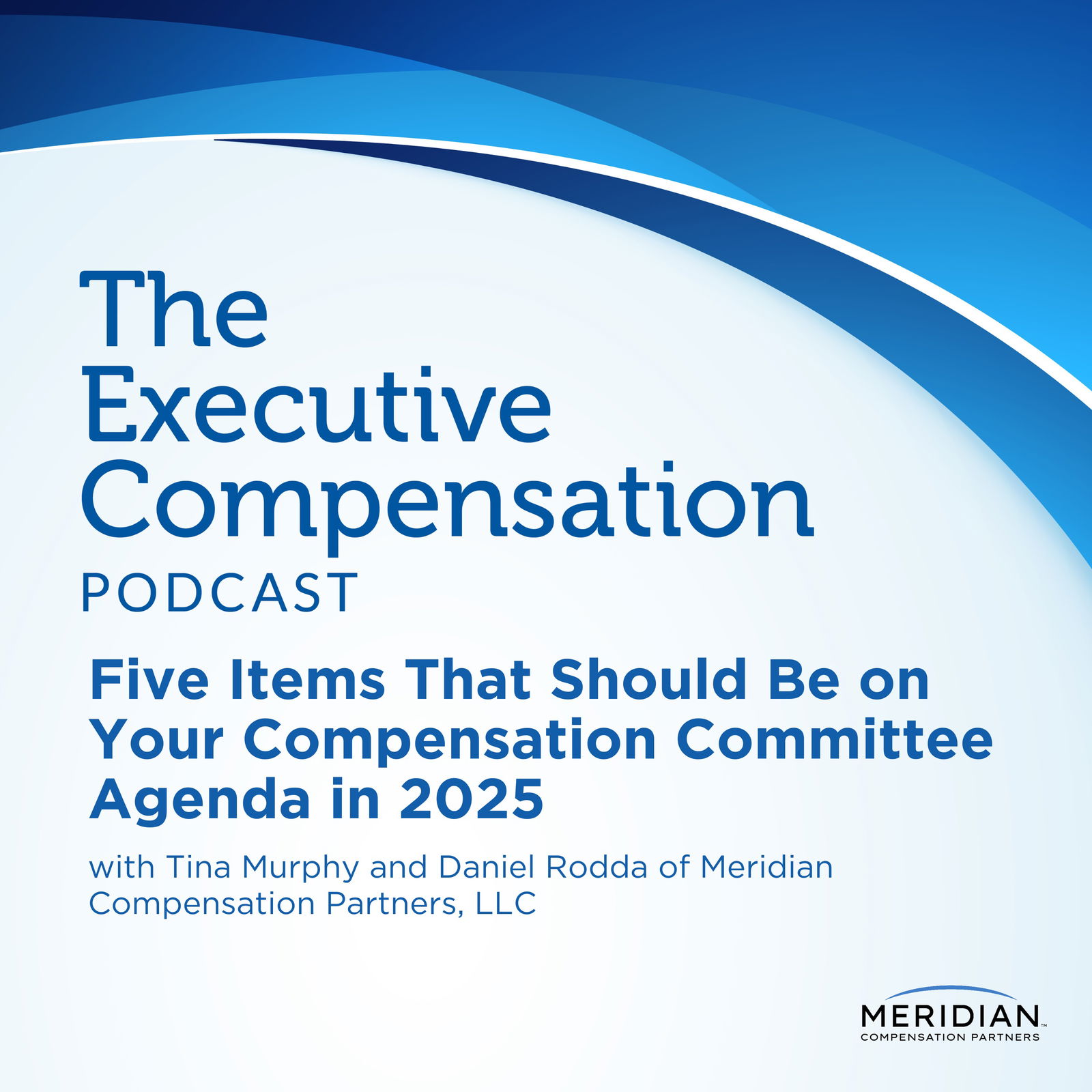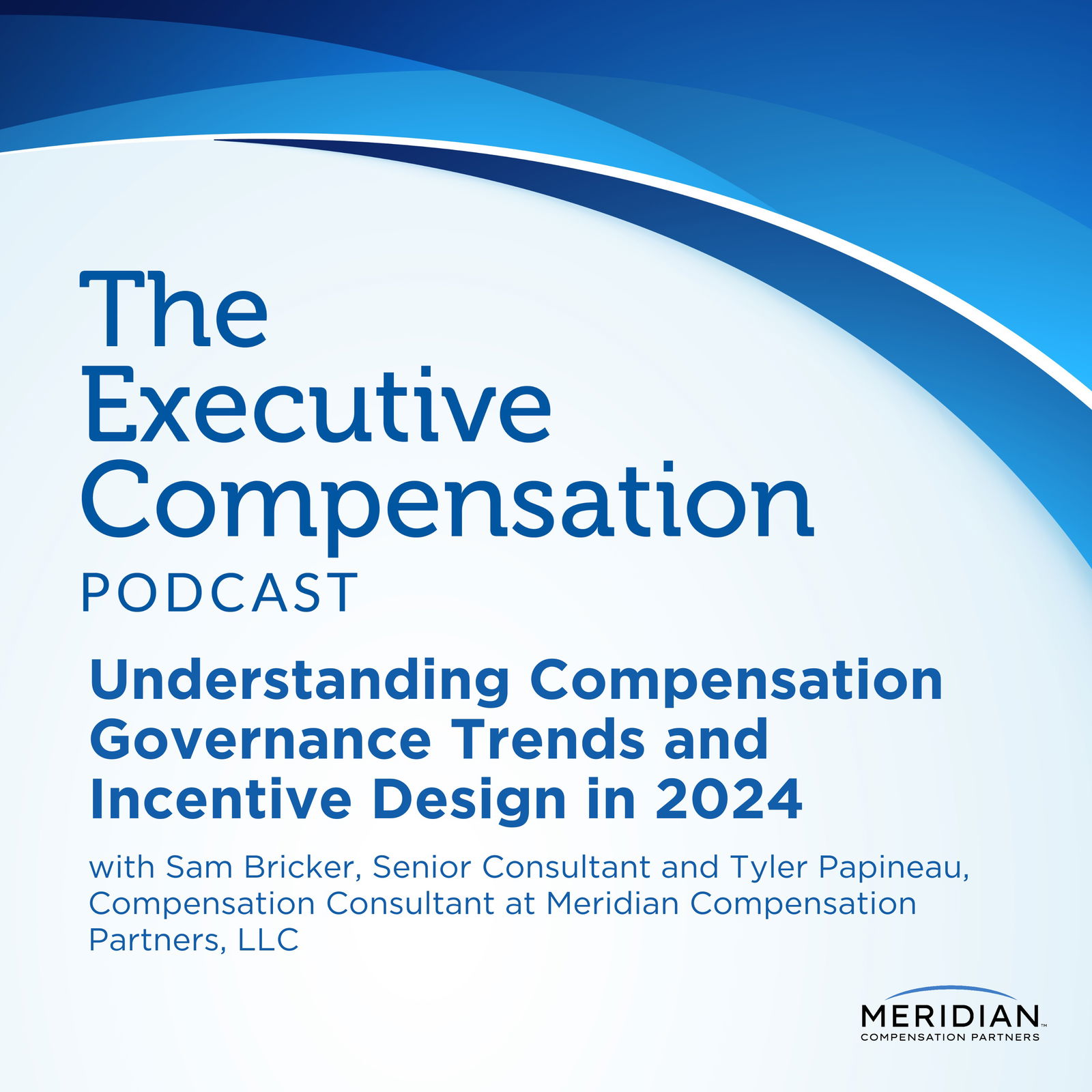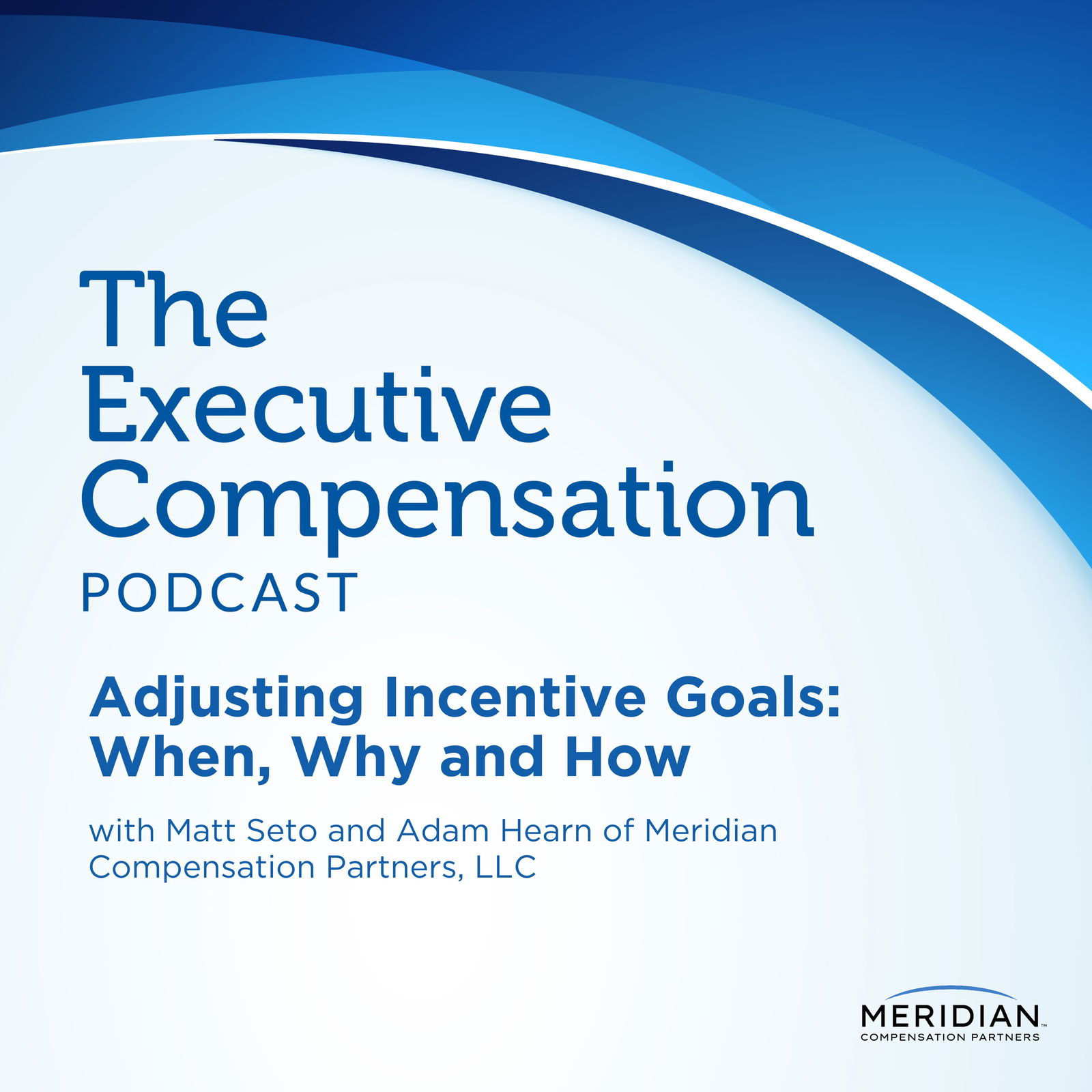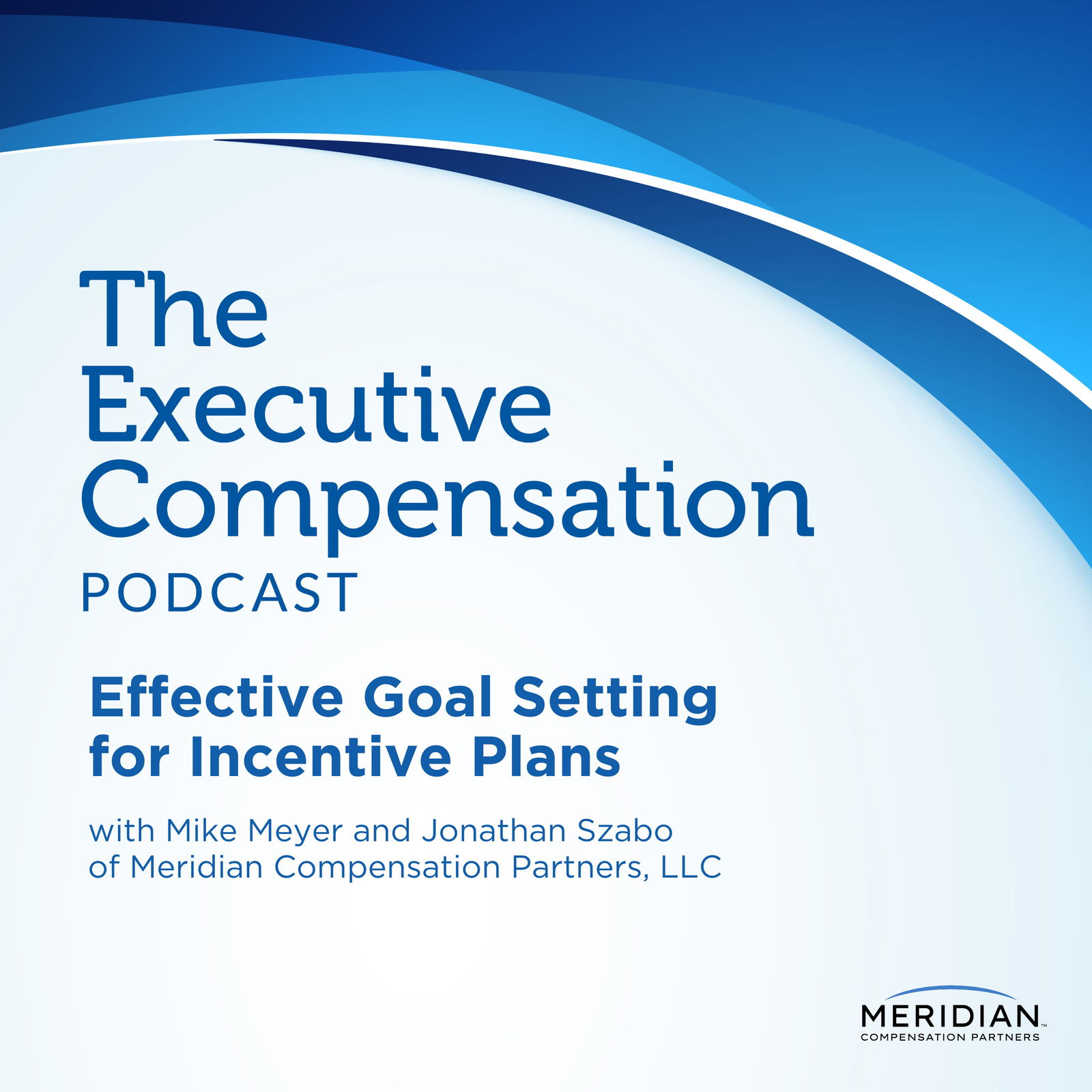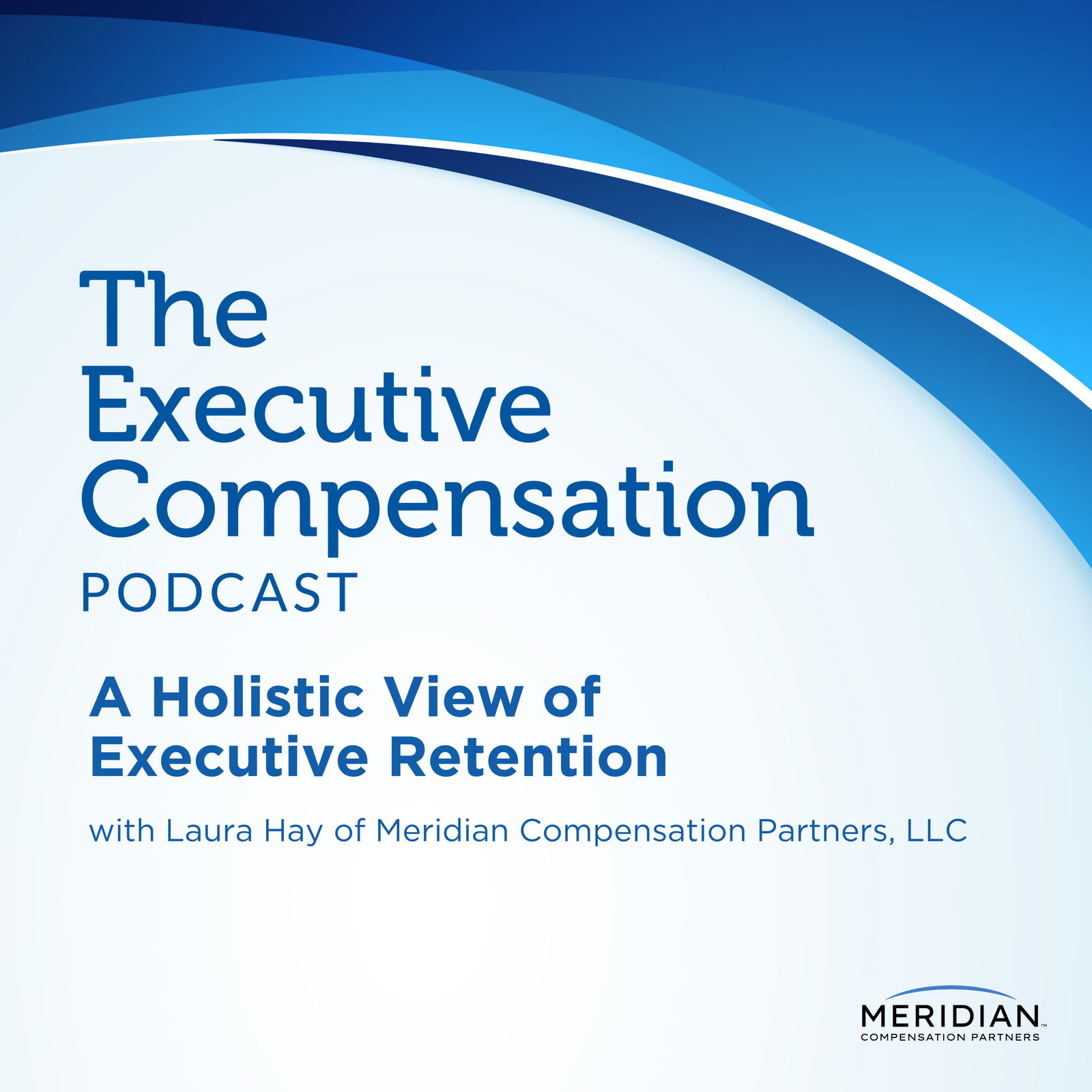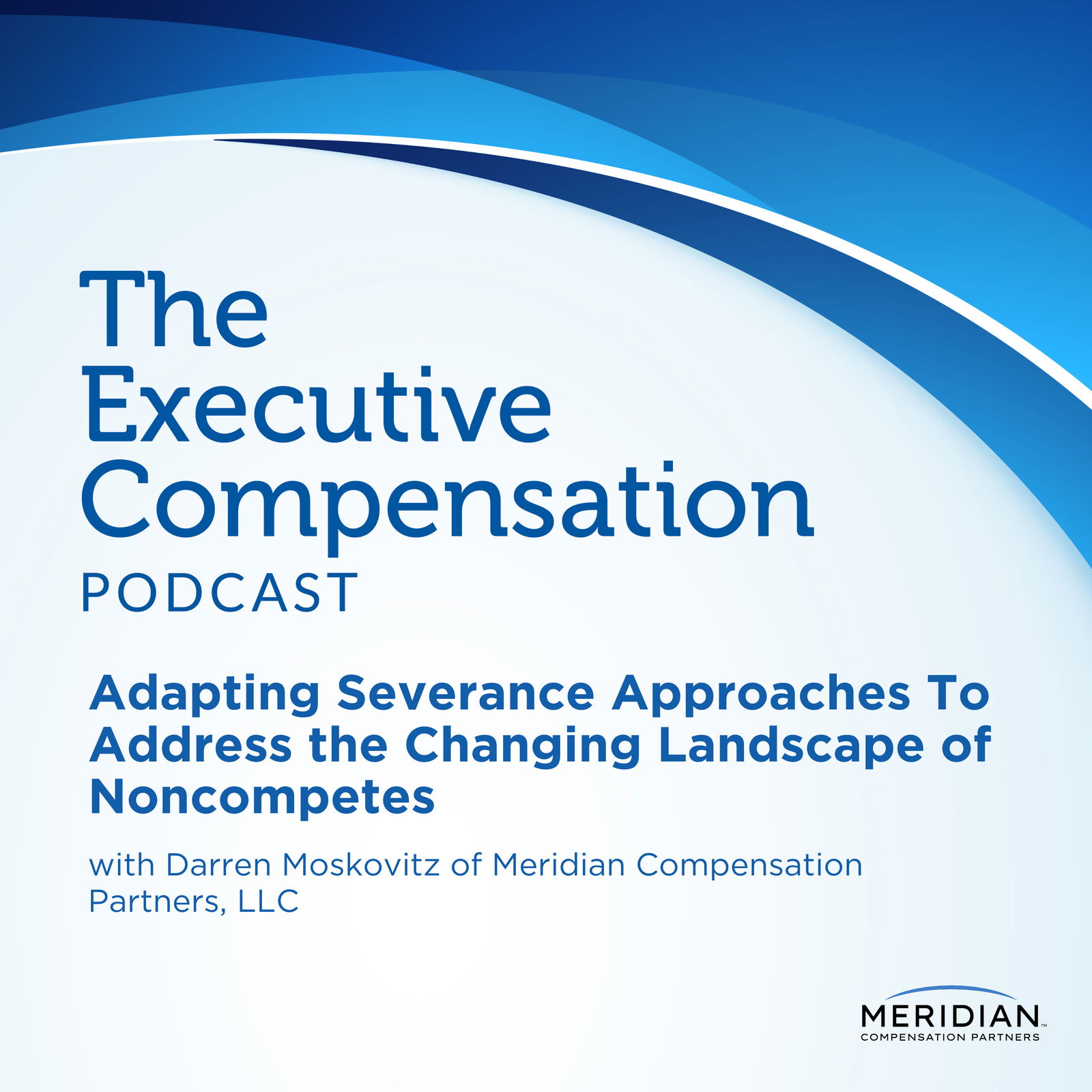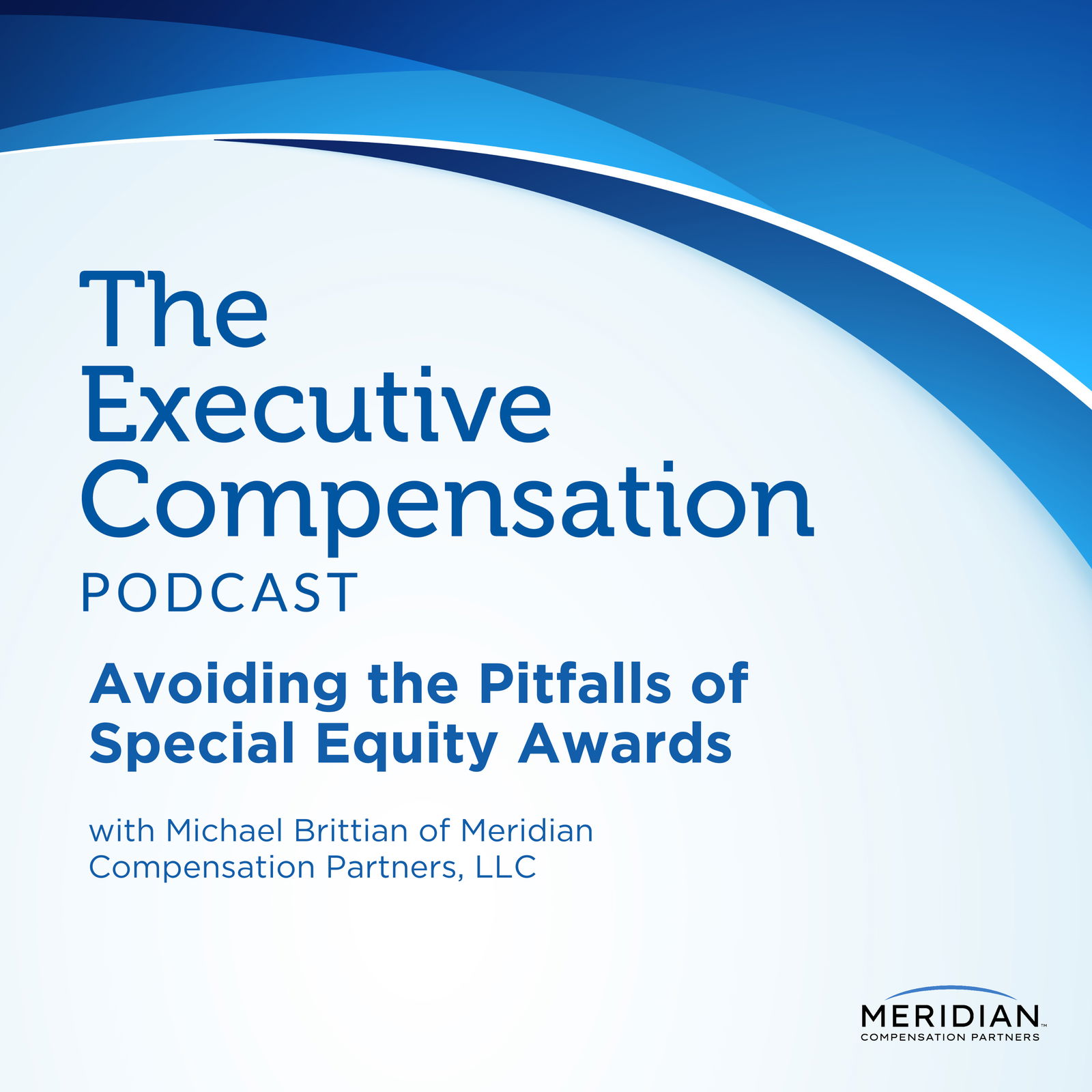Discover Executive Compensation Podcast: Conversations on Executive Pay & Compensation Committee Governance
Executive Compensation Podcast: Conversations on Executive Pay & Compensation Committee Governance

Executive Compensation Podcast: Conversations on Executive Pay & Compensation Committee Governance
Author: Meridian Compensation Partners
Subscribed: 15Played: 141Subscribe
Share
© Meridian Compensation Partners
Description
The Executive Compensation podcast from Meridian Compensation Partners is a vital resource for compensation committees, seasoned compensation professionals, or curious learners to explore all aspects of executive compensation.
We dive into all kinds of topics around how to plan executive pay, bonus, and salaries. We talk to seasoned experts about corporate governance, investor relations, and more. Tune in for an in-depth exploration of executive compensation from every different angle.
We dive into all kinds of topics around how to plan executive pay, bonus, and salaries. We talk to seasoned experts about corporate governance, investor relations, and more. Tune in for an in-depth exploration of executive compensation from every different angle.
56 Episodes
Reverse
On today’s episode, we’re joined by Ed Hauder, Principal at Meridian Compensation Partners, LLC. Ed examines the major regulatory, disclosure and proxy advisor developments shaping executive compensation in 2026, including potential SEC reforms, evolving pay-for-performance standards and growing scrutiny of proxy advisors.Key Takeaways:00:00 Introduction.01:06 Compensation committees are preparing for a pivotal year driven by regulatory and proxy advisor developments.02:03 New SEC leadership has reopened discussions around executive compensation disclosure rules.05:06 Pay versus performance and CEO pay ratio disclosures continue to draw criticism despite being mandated by Dodd-Frank.07:30 Possible disclosure changes could influence how committees approach pay design decisions.09:54 Proxy advisors are facing renewed political, legal and regulatory scrutiny.11:33 ISS is moving its pay-for-performance analysis from a three-year to a five-year timeframe.13:19 Longer vesting and retention requirements introduce uncertainty into acceptable pay structures.17:23 Glass Lewis is revising its benchmarking and pay-for-performance evaluation methodology.21:33 Tariffs and economic uncertainty are complicating goal-setting and payout discussions for future cycles.This episode is brought to you by Meridian Compensation Partners, LLC. Learn more by visiting MeridianCP.com. #Compensation #Wages #SPAC
On today’s episode, Dan Kaufman, Partner at Meridian Compensation Partners, LLC, based in Atlanta, breaks down why equity can be the biggest compensation bet a board makes and how to spot when that bet is getting too expensive.Key Takeaways:00:00 Introduction.02:33 Equity programs need board oversight because expense and dilution directly affect shareholders.04:49 Run rate tracks annual shares granted versus common shares outstanding.07:06 Share price swings can inflate run rate, so benchmark total grant value against peers, revenue or profit.10:21 Equity depth in the org and vehicle mix are major drivers of dilution.10:56 Stock options usually require more shares than full-value awards to deliver the same value.15:33 To stretch a low reserve, shift equity mix, use more cash, delay or split grants, or use inducement awards for new hires.24:23 Even if proxy advisors flag a plan, reasonable share requests typically pass with proactive shareholder outreach.This episode is brought to you by Meridian Compensation Partners, LLC. Learn more by visiting MeridianCP.com. #Compensation #Wages #SPAC
On today’s episode, we’re joined by Jeff Keckley and Ron Rosenthal, both Partners at Meridian Compensation Partners, LLC.Jeff and Ron break down the purpose of stock ownership guidelines, how they support alignment with shareholders and why companies should revisit these policies as their compensation programs evolve. They outline how guidelines are typically structured, what counts as ownership, how external stakeholders evaluate them and the growing use of holding requirements as a complement or alternative to traditional ownership timelines.Key Takeaways:00:00 Introduction.02:02 Ownership guidelines encourage executives to think and act like owners.04:17 Tiered ownership levels help clarify expectations across the leadership team.07:11 Pay mix influences how quickly executives can reach ownership requirements.11:16 Ownership guidelines focus on vested value while holding power focuses on unvested awards.13:07 Participation decisions reflect the company’s culture and overall pay philosophy.15:58 Companies make judgment calls on which share types to count toward ownership.24:30 Holding requirements help executives build and maintain ownership over time.28:01 Periodic reviews keep guidelines aligned with market practice and business needs.Resources Mentioned:Jeff Keckleyhttps://www.linkedin.com/in/jeffkeckley/Ron Rosenthalhttps://www.linkedin.com/in/ron-rosenthal-a48ab5ab/Meridian Compensation Partners, LLChttps://www.linkedin.com/company/meridian-compensation-partners-llc/This episode is brought to you by Meridian Compensation Partners, LLC. Learn more by visiting MeridianCP.com. #Compensation #Wages #SPAC
On today’s episode, Virginia Rhodes, Partner at Meridian Compensation Partners, LLC, explains how the executive chair blends board leadership with hands-on strategy, when and why companies use the role during CEO transitions and what drives compensation decisions. She outlines how clear duties, governance alignment and communication plans support smooth transitions.Key Takeaways:00:00 Introduction.03:10 Executive chairs combine board leadership with active strategic involvement.04:22 Non-executive chairs focus on oversight and governance.06:54 Among large US companies, the executive chair role remains relatively uncommon.08:33 Stability and continuity support leadership change.10:32 Early deliberate discussion strengthens compensation planning.11:39 Incentive design aligns with responsibilities and time in role.14:38 Day-to-day involvement and CEO mentorship distinguish this role.22:12 Clear duties and communications enable effective governance.Resources:Virginia Rhodeshttps://www.linkedin.com/in/virginia-rhodes-b361251/Meridian Compensation Partners, LLChttps://www.linkedin.com/company/meridian-compensation-partners-llc/This episode is brought to you by Meridian Compensation Partners, LLC. Learn more by visiting MeridianCP.com. #Compensation #Wages #SPAC #Equity #ExecutiveCompensation #Clawback
On this latest episode, Jared Berman, Partner at Meridian Compensation Partners, LLC, unpacks the fundamentals of annual incentive design.He explains what qualifies as an annual incentive plan, how organizations can align incentives with shareholder value and the balance between financial and non-financial measures. Jared also breaks down payout structures, the role of individual performance and common pitfalls that boards should avoid when designing plans.Key Takeaways:00:00 Introduction.02:00 Annual incentives are defined by timeframe rather than form of compensation.03:32 Selecting performance metrics involves aligning with priorities and benchmarking.09:39 Payout structures should follow a range rather than extremes.11:14 Thresholds and maximums are common features in payout design.13:02 Plans may include modifiers or adjustments to drive specific behaviors.14:08 Sharing ratios are useful for evaluating profit distribution.15:11 Measuring individual performance at senior levels presents unique challenges.Resources Mentioned:Jared Bermanhttps://www.linkedin.com/in/jared-berman-3950884/Meridian Compensation Partners, LLChttps://www.linkedin.com/company/meridian-compensation-partners-llc/This episode is brought to you by Meridian Compensation Partners, LLC. Learn more by visiting MeridianCP.com. #Compensation #Wages #SPAC #Equity #ExecutiveCompensation #Clawback
On today’s episode, Jared Berman, Partner at Meridian Compensation Partners, LLC, unpacks the fundamentals of market benchmarking and peer group development, explaining why these building blocks are critical to executive compensation governance. From defining what the market for talent really means to exploring the nuances of selecting peer groups, Jared highlights the art and science behind designing fair and effective pay practices.Key Takeaways:00:00 Introduction.02:00 Market benchmarking establishes reasonable executive pay.04:11 Fair comparisons require companies of similar complexity.05:13 Comparables provide structure in pay assessment.06:34 Peer groups work best with a balanced sample.08:08 Size matters but doesn’t always show complexity.09:22 Broader factors such as reach and workforce refine groups.10:05 Avoid selecting peers based only on performance.12:07 Benchmarking centers on the most senior executives.Resources Mentioned:Jared Bermanhttps://www.linkedin.com/in/jared-berman-3950884/Meridian Compensation Partners, LLChttps://www.linkedin.com/company/meridian-compensation-partners-llc/This episode is brought to you by Meridian Compensation Partners, LLC. Learn more by visiting MeridianCP.com. #Compensation #Wages #SPAC #Equity #ExecutiveCompensation #Clawback
On today’s episode, we’re joined by Jim Kzirian, Partner at Meridian Compensation Partners, LLC. Jim unpacks the concept of holding power, explaining how it can be used as a key measure of executive retention within compensation programs. He details its role in aligning executives with shareholder interests, how to calculate it and the governance practices committees should follow to ensure executives are locked in and motivated to perform.Key Takeaways:00:00 Introduction.02:37 Holding power serves as a critical measure of executive retention.07:41 Assessing outstanding awards and their value.11:11 Volatile share prices require thoughtful approaches to measurement.12:57 Design elements can impact the stability and effectiveness of holding power.15:45 Committees can take targeted actions when holding power appears insufficient.18:56 Ongoing review ensures retention, alignment and governance objectives are met.Resources Mentioned:Jim Kzirianhttps://www.linkedin.com/in/james-jim-kzirian-86132a2/Meridian Compensation Partners, LLChttps://www.linkedin.com/company/meridian-compensation-partners-llc/This episode is brought to you by Meridian Compensation Partners, LLC. Learn more by visiting MeridianCP.com.#Compensation #Wages #SPAC #Equity #ExecutiveCompensation #Clawback
Jim Heim, Partner, and Kartik Balaram, Principal, both of Meridian Compensation Partners, LLC, share practical insights on how compensation committees can evaluate and refine long-term incentive programs to balance shareholder alignment, retention and performance outcomes across various market conditions.Key Takeaways:00:00 Introduction.02:32 The balance between retaining executives and aligning pay with shareholder outcomes.04:12 How compensation programs support, rather than drive, business strategies.06:26 The importance of aligning incentive structures with company goals over different time horizons.07:57 Why evaluating potential pay outcomes helps manage performance and risk.09:32 When simplified metrics can effectively align incentives with shareholder interests.11:04 Identifying risks of focusing too heavily on retention over accountability.14:35 Adapting performance measurement periods to match business predictability.18:19 The need to balance regulatory guidance with company-specific priorities.23:52 Why straightforward program designs often achieve stronger outcomes.Resources Mentioned:Jim Heimhttps://www.linkedin.com/in/jimheimcompensationconsultant/Kartik Balaramhttps://www.linkedin.com/in/kartik-balaram-9273604/Meridian Compensation Partners, LLChttps://www.linkedin.com/company/meridian-compensation-partners-llc/This episode is brought to you by Meridian Compensation Partners, LLC. Learn more by visiting MeridianCP.com. #Compensation #Wages #SPAC #Equity #ExecutiveCompensation #Clawback
On today’s episode, we’re joined by Patrick Powers, Partner, and Rosie Newman, Principal, both at Meridian Compensation Partners, LLC. Patrick and Rosie explain how executive perks are evolving from legacy benefits into strategic tools for productivity, security and financial well-being. They break down regulatory considerations, disclosure thresholds and the factors boards weigh when approving perquisites like corporate aircraft use, executive physicals and cybersecurity support.Key Takeaways:(02:29) Perquisites are subject to specific tax and disclosure regulations.(04:50) Financial planning support is seen as a tool for risk reduction.(07:10) The use of allowances has grown as a streamlined approach.(09:14) Some traditional perks are regaining popularity.(10:45) Security-related benefits are increasingly relevant.(13:47) Board approval often involves third-party risk assessments.(19:22) External advisory opinions may influence, but rarely override, decisions.(21:44) Companies are re-evaluating executive security and related disclosures.Resources Mentioned:Patrick Powershttps://www.linkedin.com/in/patrick-powers-678b8694/Rosie Newmanhttps://www.linkedin.com/in/rosie-newman-35335925/US Securities and Exchange Commissionhttps://www.sec.gov/UnitedHealthcarehttps://www.uhc.com/Meridian Compensation Partners, LLChttps://www.linkedin.com/company/meridian-compensation-partners-llc/This episode is brought to you by Meridian Compensation Partners, LLC. Learn more by visiting MeridianCP.com. #Compensation #Wages #SPAC #Equity #ExecutiveCompensation #Clawback
On today’s episode, we’re joined by Chris Havey, Partner at Meridian Compensation Partners, LLC. Chris shares practical strategies for maximizing the value of Q2 and Q3 compensation committee meetings. With fewer urgent agenda items in the off season, these months present a valuable opportunity for committees to assess, test and refine their executive compensation programs. Chris outlines five key areas where thoughtful evaluation and preparation can significantly improve year-round decision-making.Key Takeaways:(02:26) Use lighter meeting agendas to focus on strategic priorities.(06:20) Revisit compensation philosophy and its connection to guiding principles.(06:48) Assess whether performance outcomes reflect compensation payouts.(08:53) Conduct benchmarking to identify alignment or deviation from market trends.(10:16) Review potential liabilities and risks across compensation programs.(13:21) Improve proxy clarity and ensure messaging aligns with pay practices.(14:36) Use compensation design to support investor relations.(15:05) Incorporate shareholder feedback into future planning.Resources Mentioned:Chris Haveyhttps://www.linkedin.com/in/chris-havey-12a5118/Meridian Compensation Partners, LLChttps://www.linkedin.com/company/meridian-compensation-partners-llc/This episode is brought to you by Meridian Compensation Partners, LLC. Learn more by visiting MeridianCP.com. #Compensation #Wages #SPAC #Equity #ExecutiveCompensation #Clawback
On today’s episode, we’re joined by Tom McNeill and Donald Kalfen, both Partners at Meridian Compensation Partners, LLC. They explore the strategic importance of engaging with shareholders on executive pay, highlighting best practices for proactive and reactive engagement.Key Takeaways: (03:46) Most large public companies engage with shareholders regularly, often well before proxy season.(06:06) Engagements often occur in late summer and fall when proxy advisors and shareholders are most receptive.(06:53) Ongoing dialogue with shareholders is crucial for building trust and addressing concerns proactively.(08:10) The compensation committee chair or a non-executive chair typically participates in engagements.(09:17) Proxy solicitors and investor relations teams play key roles in arranging discussions.(11:25) Robust proxy disclosure improves transparency, including details on the nature and outcomes of shareholder engagements.(13:00) Companies receiving less than 70% approval on say on pay votes should engage with shareholders to address concerns.(13:31) Companies must avoid disclosing material non-public information to individual shareholders during engagements.(15:22) Consult counsel and take their advice on proper methods to reveal material non-public information. Recources Mentioned:Tom McNeillhttps://www.linkedin.com/in/tom-mcneill-87722312/Donald Kalfenhttps://www.linkedin.com/in/donald-kalfen-baa44b30/Meridian Compensation Partners, LLChttps://www.linkedin.com/company/meridian-compensation-partners-llc/This episode is brought to you by Meridian Compensation Partners, LLC. Learn more by visiting MeridianCP.com. #Compensation #Wages #SPAC #Equity #ExecutiveCompensation #Clawback
On today’s episode, we’re joined by Jamie McGough, Partner at Meridian Compensation Partners, LLC. Jamie discusses strategies for evaluating the alignment between executive pay and company performance.Key Takeaways:(01:15) Total shareholder return is essential, plus profitability and other financial metrics relevant to the company.(05:30) Treatment of performance plans requires judgment when analyzing pay.(08:40) Overlapping cycles and grant timing complicate pay-performance analysis. No perfect solution exists.(13:02) The CEO is central to focus on.(17:41) Pay versus performance analysis is fundamentally a governance tool for committees.(20:22) SEC disclosure rules focus on individuals and accounting values rather than pay structures.Resources Mentioned:Jamie McGough -https://www.linkedin.com/in/jamie-mcgough-2007a9a/Meridian Compensation Partners, LLC | LinkedIn -https://www.linkedin.com/company/meridian-compensation-partners-llc/Meridian Compensation Partners, LLC | Website -https://www.meridiancp.com/This episode is a repost of a previously released conversation with Jamie McGough, Partner at Meridian Compensation Partners, LLC. Given the continued relevance of this discussion, we are sharing it again for our listeners.Jamie discusses strategies for evaluating the alignment between executive pay and company performance. #Compensation #Wages #SPAC #Equity #ExecutiveCompensation #Clawback
On today’s episode, we’re joined by Partner Gerard Leider and Head of Research and Content, Principal Edward Hauder, both of Meridian Compensation Partners, LLC.Gerard and Edward break down the critical aspects of equity retirement provisions and their significant role in executive transitions. They explore how defining retirement and aligning equity policies with organizational goals can influence seamless leadership successions.Key Takeaways:(02:20) Equity compensation forms a significant part of executive pay.(04:23) Committees should align retirement and equity policies with market practices.(06:33) Programs must work in harmony to ensure equity consistency.(08:58) Committees should review equity treatments annually and during major transitions.(11:10) Retirement definitions like 60 and five attract late-career hires.(15:11) Standardized retirement definitions avoid one-off negotiations.(18:32) Clear retirement policies ensure balanced executive transitions.(20:02) Align policies, coordinate plans and require notice.(23:15) Disclosure of retirement notice depends on legal guidance and circumstances.Resources Mentioned:Gerard Leider -https://www.linkedin.com/in/gerard-leider-7348501/Edward Hauder -https://www.linkedin.com/in/edwardhauder/Meridian Compensation Partners, LLC -https://www.linkedin.com/company/meridian-compensation-partners-llc/This episode is brought to you by Meridian Compensation Partners, LLC. Learn more by visiting MeridianCP.com. #Compensation #Wages #SPAC #Equity #ExecutiveCompensation #Clawback
On today’s episode, we’re joined by Tina Murphy, Principal, and Daniel Rodda, Partner, at Meridian Compensation Partners, LLC. Daniel and Tina outline five essential agenda topics that compensation committees should consider adding to their calendars for 2025. These strategies focus on optimizing executive compensation practices, addressing shareholder concerns and ensuring long-term alignment with corporate goals.Key Takeaways:(02:49) Committees should add pay analysis, say on pay prep, share plan reviews, charter updates and program audits to 2025 agendas.(05:04) Realizable pay aligns pay with performance; holding power supports long-term retention and shareholder interests.(11:36) Modeling tests and addressing disclosure concerns reduce risks of negative say on pay recommendations.(17:31) Equity usage analyses balance talent strategy, shareholder interests and program sustainability.(21:32) Annual equity reviews track effectiveness; peer benchmarking can be periodic based on industry needs.(23:01) Annual charter reviews and human capital focus align committees with governance priorities.(26:48) Holistic audits keep compensation programs competitive, strategic and best-practice aligned.(29:11) Regular audits address regulatory changes and ensure severance plans and stock guidelines stay competitive.Resources Mentioned:Tina Murphy -https://www.linkedin.com/in/tina-murphy-8a63ab8/Daniel Rodda -https://www.linkedin.com/in/daniel-rodda-756b2b/Meridian Compensation Partners, LLC -https://www.linkedin.com/company/meridian-compensation-partners-llc/This episode is brought to you by Meridian Compensation Partners, LLC. Learn more by visiting MeridianCP.com. #Compensation #Wages #SPAC #Equity #ExecutiveCompensation #Clawback
On today's episode, we’re joined by Senior Consultant Sam Bricker and Compensation Consultant Tyler Papineau, both of Meridian Compensation Partners, LLC. Sam and Tyler discuss Meridian’s annual study on corporate governance and incentive design, covering trends in clawbacks, board refreshment and pay-for-performance disclosures. They also explore how companies adapt to new regulations and the evolving executive compensation landscape.Key Takeaways:(01:43) Overview of Meridian's corporate governance and incentive design study.(03:41) How companies expanded clawback policies beyond SEC regulations.(06:00) The increase in coverage for clawback policies across broader employee groups.(09:37) Board refreshment trends, including director tenures and overboarding policies.(11:48) The role of term limits and retirement ages in board refreshment.(14:46) How companies are disclosing pay versus performance, with a shift away from tailored disclosures.(17:17) The role of compensation committees in pay-for-performance discussions.(18:24) The continued use and evolution of TSR (total shareholder return) as a performance metric.Resources Mentioned:Sam Bricker -https://www.linkedin.com/in/sam-bricker-495393104/Tyler Papineau -https://www.linkedin.com/in/tyler-papineau-b95604204/Meridian Compensation Partners, LLC -https://www.linkedin.com/company/meridian-compensation-partners-llc/This episode is brought to you by Meridian Compensation Partners, LLC. Learn more by visiting MeridianCP.com. #Compensation #Wages #SPAC #Equity #ExecutiveCompensation #Clawback
On today’s episode, we’re joined by Matt Seto and Adam Hearn, both Principals at Meridian Compensation Partners, LLC. Matt and Adam explore the complexities of annual incentive plans, particularly how companies should navigate unforeseen circumstances that may necessitate adjustments to executive goals.Key Takeaways:(02:30) Common financial metrics used in annual incentive plans. (04:29 ) Differences between hardwired and discretionary adjustments in incentive plans. (05:58) Why making adjustments should be guided by business principles, not rules. (08:11) Guidelines for determining when adjustments are appropriate. (09:54) The impact of management decisions on incentive plans and compensation. (13:25) Importance of well-documented frameworks for executive committees. (16:25) How communication between management and the board influences adjustments. (19:42) The significance of external and internal perceptions when making adjustments.Resources Mentioned:Matt Seto - https://www.linkedin.com/in/mattseto/Adam Hearn - https://www.linkedin.com/in/adam-hearn-870b638/Meridian Compensation Partners, LLC - https://www.meridiancp.com/This episode is brought to you by Meridian Compensation Partners, LLC. Learn more by visiting MeridianCP.com. #Compensation #Wages #SPAC #Equity #ExecutiveCompensation #Clawback
On today’s episode, we’re joined by Partner, Jonathan Szabo, and Principal, Mike Meyer, both of Meridian Compensation Partners, LLC.Jonathan and Mike dive deep into the complexities of establishing meaningful goals for incentive plans. They share practical strategies for setting both short-term and long-term goals that align company performance with desired executive behaviors.Key Takeaways:(02:22) Compensation philosophy provides blueprints for decision-making.(04:02) Philosophical discussions around goal setting are crucial.(04:46) Involving members of the audit committee can enhance goal-setting.(07:17) Adjustments to incentive plans require consistent methodology.(07:37) Factors like internal budgets and historical performance impact goals.(12:01) Committees should consider economic predictability when setting goals.(17:20) Strategies for uncertain times include setting growth rate targets.(21:40) Approaches differ for short-term vs. long-term incentives.Resources Mentioned:Jonathan Szabo - https://www.linkedin.com/in/jonathan-szabo-13045493/Mike Meyer - https://www.linkedin.com/in/mike-meyer-626a6071/Meridian Compensation Partners, LLC - https://www.linkedin.com/company/meridian-compensation-partners-llc/This episode is brought to you by Meridian Compensation Partners, LLC. Learn more by visiting MeridianCP.com. #Compensation #Wages #SPAC #Equity #ExecutiveCompensation #Clawback
On today’s episode, we’re joined by Laura Hay, Partner at Meridian Compensation Partners, LLC. Laura explores the critical role of compensation in retaining executive talent, discussing the interplay of business conditions, compensation structures and the importance of strategic retention initiatives. She offers insights into identifying retention risks and structuring compensation to mitigate these risks effectively.
Key Takeaways:
(01:16) Change in management increases retention risks.
(01:47) High executive turnover in healthcare and technology sectors.
(03:16) Retention is not about keeping 100% of executives.
(04:20) Lack of a good succession plan can be a retention destroyer.
(05:20) Outdated compensation designs harm retention efforts.
(08:11) Strategic direction and investment in people support retention.
(12:15) Annual compensation programs should drive retention.
(15:33) Special retention awards should be carefully structured and justified.
(18:13) Proactive shareholder communication can mitigate criticism of retention awards.
Resources Mentioned:
Laura Hay - https://www.linkedin.com/in/laurahay/
Meridian Compensation Partners, LLC -
https://www.linkedin.com/company/meridian-compensation-partners-llc/
This episode is brought to you by Meridian Compensation Partners, LLC. Learn more by visiting MeridianCP.com.
#Compensation #Wages #SPAC #Equity #ExecutiveCompensation #Clawback
On today’s episode, we’re joined by Darren Moskovitz, Partner at Meridian Compensation Partners, LLC.
Darren dives into the critical aspects of executive compensation arrangements, especially focusing on the implications of executive departures, severance practices and the recent Federal Trade Commission (FTC) rulings on non-compete restrictions.
Key Takeaways:
(00:20) The importance of considering annual and long-term incentives during executive departures.
(01:04) Overview of typical severance approaches: general severance vs. change-in-control severance.
(03:35) Understanding the commercial and reputational reasons for severance plans.
(06:00) Historical context and evolution of severance practices since the 1980s.
(08:00) Differentiation between general severance and change-in-control severance benefits.
(09:20) The impact of FTC’s new rulings on non-compete provisions.
(13:19) Potential changes in executive compensation programs due to new FTC regulations.
(20:30) Exploring the concept of garden leave as a potential alternative to non-compete agreements.
(24:42) How non-solicitation and confidentiality agreements might be affected by FTC changes.
(27:03) Immediate steps companies should consider in response to potential FTC regulations.
Resources mentioned:
Darren Moskovitz -
https://www.linkedin.com/in/darren-moskovitz-00b42b/
Meridian Compensation Partners, LLC -
https://www.meridiancp.com/
This episode is brought to you by Meridian Compensation Partners, LLC. Learn more by visiting MeridianCP.com.
#Compensation #Wages #SPAC #Equity #ExecutiveCompensation #Clawback
On today’s episode, we’re joined by
Michael Brittian, Partner at Meridian Compensation Partners, LLC. Michael explores the nuanced world of special one-time equity awards, offering insights into when and why these can be pivotal for executive compensation strategies, especially during leadership transitions or significant company achievements.
Key Takeaways:
(01:33) Michael outlines the typical components of executive compensation packages.
(05:11) Common scenarios where special compensation awards are beneficial.
(07:06) The benefits of accomplishing goals using the existing compensation plan over instituting special equity awards.
(09:39) Principles for designing effective and justified special awards.
(11:58) The importance of aligning special awards with company goals and shareholder expectations.
(16:28) Discussion on setting realistic and strategic performance goals for special awards.
(19:54) Special awards should not be a replacement for solid compensation structure.
Resources Mentioned:
Michael Britton -
https://www.linkedin.com/in/michael-brittian-4896201/
Meridian Compensation Partners, LLC -
https://www.meridiancp.com/
This episode is brought to you by Meridian Compensation Partners, LLC. Learn more by visiting MeridianCP.com.
#Compensation #Wages #SPAC #Equity #ExecutiveCompensation #Clawback



